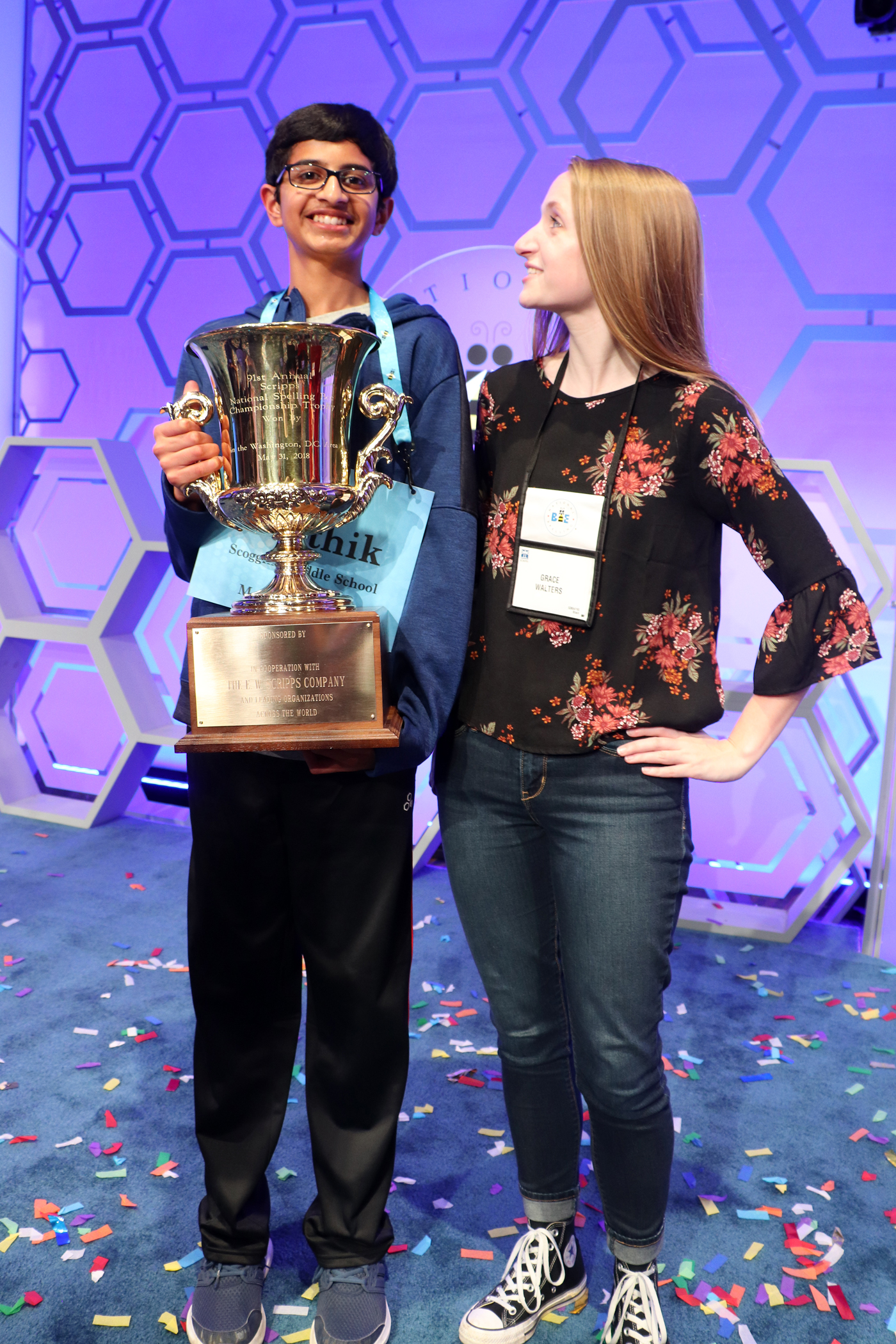
When 14-year-old Karthik Nemmani won the Scripps National Spelling Bee on Thursday night, it was the culmination of months of highly specialized training. He studied carefully curated lists of words and learned the patterns and mechanics of word etymologies he was statistically most likely to encounter on the big stage.
This is way past studying the dictionary and memorizing words.
Training for the big event has advanced so much so quickly that Nemmani’s 16-year-old coach, Grace Walters, refers to her time on the spelling bee circuit as “a different era.”
“Back in the old days — I say that like I’m old — but back in, say, the 2000s, most kids just had the dictionary. They just had to crack open that big book and dive in,” Walters told TIME. “Nowadays, the kids are using computers — which is so foreign to me.”
“Spelling is intimacy with languages. It’s knowing the patterns and the roots behind Latin words, the stems in Greek words,” Walters added. “I know that if you ask Karthik, he’ll tell you he didn’t know several words up there, and he used patterns that he had learned to figure out words and to piece them together on stage even though he had never heard them before.”
Nemmani’s list of words included ankyloglossia (“limited normal movement of the tongue”), condottiere (“a mercenary soldier”) and paucispiral (“spiral with few turns”). He won when he correctly spelled koinonia, meaning “the Christian fellowship or body of believers.”
Leading up to the bee, Nemmani spent at least four hours a day studying, Reuters reported. Since November, he and Walters have met via FaceTime for two-hour coaching sessions twice a week, she said. In between coaching sessions, they texted to discuss different strategies. During the past two months, they intensified training to include nightly vocabulary tests.
“He was putting in so much work, staying up late, getting up early, really devoting himself and wanting to win this bee,” said Walters, an accomplished speller who competed in her last spelling bee in 2015 and now coaches other students.
To prepare for the Scripps National Spelling Bee, Walters coached Nemmani on language patterns and etymologies — the roots and histories of words. She created statistically accurate lists of roots and word categories — such as medical, geological or zoological terms — that are most likely to appear in the Scripps bee based on past competitions. She quizzed him on words and discussed what he got right and wrong. And Nemmani honed his question routine, asking for a definition, language of origin, alternate pronunciation and part of speech before spelling each word.
“The main thing is dedication. You have to want it, and you have to want to work for it,” said Walters, who wore a bee ring to Thursday’s competition for good luck and said a prayer before and after each word Nemmani was asked to spell. She was “elated” when he won. “As a spelling coach, for the first time, I am without words,” she said.
Walters, a rising high school senior planning to apply to college in the fall, said the competition has become more difficult in recent years, in part because of a proliferation of study materials and spelling resources. “The bee has to get harder because kids are more prepared,” she said.
Nemmani spent a lot of time practicing on a computer, she said, using Excel spreadsheets to create lists of words, review them and quiz himself.
“It does require lots of sacrifices. When I was a speller, I gave up going to social events, going to parties. I gave up some sports that I played,” Walters said, adding that Nemmani sometimes had to skip tennis practices to study, even though he loves the sport.
“Doing things that you love that are just hobbies — like maybe you’re into video games,” she said, “yeah, can’t play video games and study for the spelling bee.”
More Must-Reads From TIME
- The 100 Most Influential People of 2024
- Coco Gauff Is Playing for Herself Now
- Scenes From Pro-Palestinian Encampments Across U.S. Universities
- 6 Compliments That Land Every Time
- If You're Dating Right Now , You're Brave: Column
- The AI That Could Heal a Divided Internet
- Fallout Is a Brilliant Model for the Future of Video Game Adaptations
- Want Weekly Recs on What to Watch, Read, and More? Sign Up for Worth Your Time
Write to Katie Reilly at Katie.Reilly@time.com